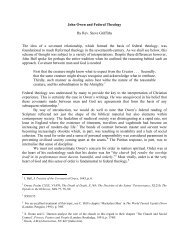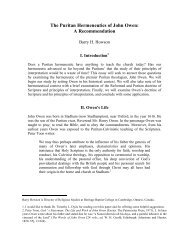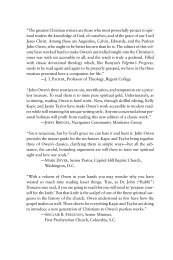M.TH. LONG DISSERTATION (LD6.1) - John Owen
M.TH. LONG DISSERTATION (LD6.1) - John Owen
M.TH. LONG DISSERTATION (LD6.1) - John Owen
Create successful ePaper yourself
Turn your PDF publications into a flip-book with our unique Google optimized e-Paper software.
<strong>John</strong> <strong>Owen</strong>’s Theological Context<br />
transcribes is to highlight a special bond between Christ and the church. Clearly he<br />
believed that, although they might not use Reformation language of imputation, the<br />
Fathers upheld the implications of imputation grounded in union with Christ. 140 In<br />
finding evidence for a Protestant view of justification in the Fathers, <strong>Owen</strong> stands in<br />
contrast to contemporary scholars, who tend to regard the doctrine of imputation as a<br />
Reformation novelty. 141 Nevertheless, whether or not <strong>Owen</strong>’s patristic exegesis was<br />
accurate, what is obvious is his concern, common to Reformed Orthodox theologians, to<br />
emphasize the catholicity of his teaching. This is also evident earlier in the treatise when<br />
he quotes the sixteenth century Roman Catholic humanist Albertus Pighius, a leading<br />
anti-Reformation apologist, as an advocate of the Protestant doctrine at this point. 142<br />
Union with Christ lies on or just below the surface of much of the argument in<br />
Justification by Faith. It also plays a significant role in various other works by <strong>Owen</strong>. 143 In<br />
his discussion in this treatise, he notes that among his contemporaries there had been<br />
much debate concerning personhood; however, he wishes to avoid arguments<br />
concerning natural, legal, civil and political persons, for Christ and believers enjoy a<br />
distinctive union: they are ‘one mystical person’. 144 Thus, although the union of Christ and<br />
the church may in some senses resemble other types of union, such as natural or political,<br />
discussion of these tends rather to obscure than to illuminate the nature of union with<br />
Christ. Demonstrating his comfort with the analogical language of Scripture, 145 <strong>Owen</strong><br />
140 Kapic 2001: 145.<br />
141 E.g., McGrath 1998: 189f.; cf. Kapic 2001: 144.<br />
142 <strong>Owen</strong> 1850-55: V.38-40.<br />
143 E.g., <strong>Owen</strong> 1850-55: I.355-74; III.463-67, 478, 513-27; IV.383-86; V.175-80, 196, 208-217; X.468-71;<br />
XI.336-41; XIII.22-25; XXI.142-60.<br />
144 <strong>Owen</strong> 1850-55: V.178, italics in original.<br />
145 Cf. <strong>Owen</strong> 1850-55: V.12: ‘The Holy Ghost, in expressing the most eminent acts in our justification…is<br />
pleased to make use of many metaphorical expressions. For any to use them now in the same way and to the<br />
same purpose, is esteemed rude, undisciplinary, and even ridiculous; but on what grounds? He that shall<br />
deny that there is more spiritual sense and experience conveyed by them into the hearts and minds of<br />
believers (which is the life and soul of teaching things practical), than in the most accurate philosophical<br />
expressions, is himself really ignorant of the whole truth in this matter. The propriety of such expressions<br />
39





